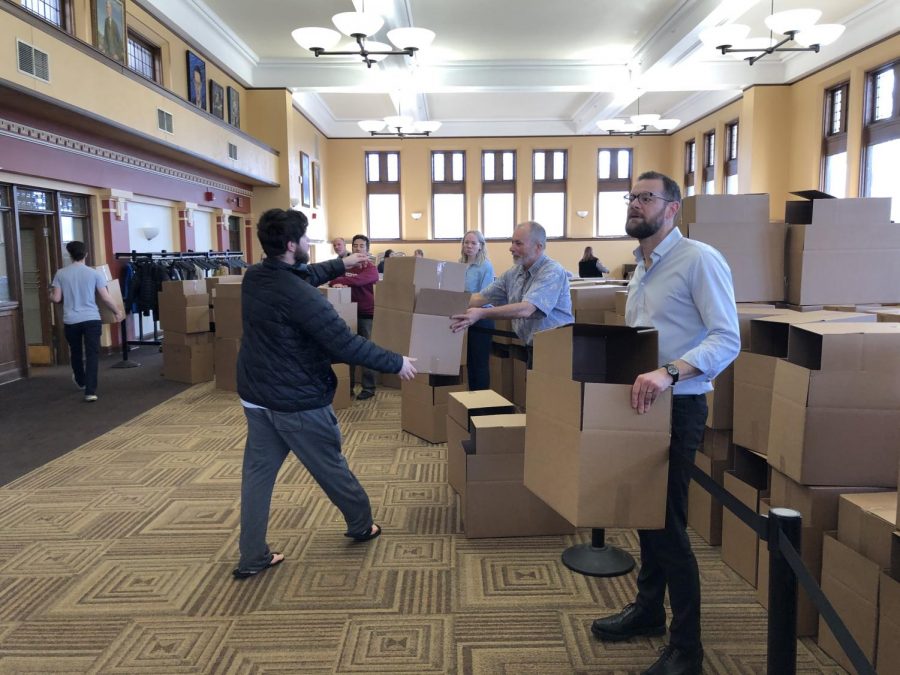A Community in Isolation and Collaboration: COVID-19 Year in Review
Faculty and staff distributed packing boxes to students in the Root Room in Carnegie Building beginning March 13. Students in College housing were required to vacate campus by Monday, March 16 at noon.
The World Health Organization declared COVID-19 a global pandemic on March 11, 2020, sending the whole world into a tailspin. A year later, life on campus looks strikingly different than before the pandemic, and our college experience looks different than what we pictured for ourselves, but we appreciate the adjustments made to keep the Oberlin community as safe as possible, as President Carmen Twillie Ambar recently discussed with The New York Times.
For the Review, the anniversary of the pandemic means close to one year has passed since we’ve transitioned to online-only publication. As a staff we learned new ways to keep our community informed with each new College update and public health development. We also went beyond our usual framework, publishing a climate and environment special issue last Earth Day, and bolstered our social media presence on Twitter and Instagram.
Looking at the last twelve months of Review coverage tells you the story of Oberlin’s community in a pandemic, constantly striving to innovate and support one another through an unprecedented time. Explore the Review’s biggest stories from the past year as Oberlin looks ahead to the pathway out of the pandemic.
Navigating COVID-19, One Year Later
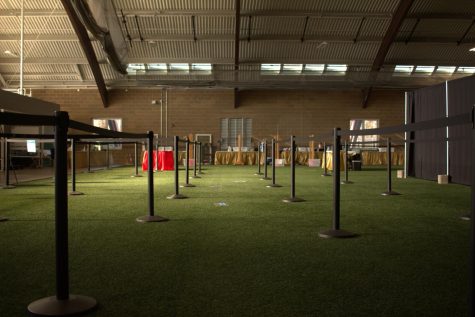
On this day last year, President Ambar declared the abrupt end of in-person classes and informed the student body that everyone should depart campus by noon on Monday, March 16. As the semester was nearing its end, the College and Conservatory introduced new COVID-19 grading protocols for the spring 2020 semester in order to ease the transition to remote learning during a global pandemic. As the semester came to a close, concerns arose among international students who faced constantly changing federal guidance regarding their visa statuses. While many international students remained in the U.S. over the summer, international students living abroad faced unprecedented obstacles returning to the U.S. as embassies closed worldwide and the U.S. placed travel restrictions on many countries.
In July, President Ambar announced the College’s layered plan to bring back students in a COVID-safe manner: a new three-semester de-densification schedule, ObieSafe guidelines, single-occupancy housing, and a new course catalog with a mix of in-person, remote, and hybrid classes. Due to limited practice spaces, many Conservatory students used their rooms as both living and practice spaces.
The transition to new COVID-safe guidelines did not go smoothly for all of campus; 16 students were sent home within the first month of the fall semester for breaching the College’s Community Agreement. In an effort to help students maintain COVID-safe practices, Student Senate unveiled ObieReal, a campaign to provide realistic guidelines for students. As most first-, second-, and fourth-years studied on campus in the fall, third-year students embarked on the College’s new career-readiness program — the Junior Practicum. Off-campus second-years engaged in their own career-readiness program this spring.
While College cases remained negligible, COVID-19 continued to surge in Ohio. In Lorain County, prisons grappled with overcrowding and understaffing in the face of mounting COVID-19 cases. In November, Governor Mike DeWine warned that many colleges and universities may not be able to return to in-person learning in January. Later that month, President Ambar postponed students’ return to campus for the spring semester by three weeks.
Check out our top COVID-19 stories this year:
COVID-19 Outbreak Continues, College Moves to Remote Campus
College Releases Details for Three Semesters of In-Person Classes
Here are some stories you might have missed:
Lorain County Prisons Struggle with COVID Cases, Understaffing, Overcrowding
Students Call for Peer-to-Peer Intervention for COVID-19 Safety Violations
Renewed Movements for Justice
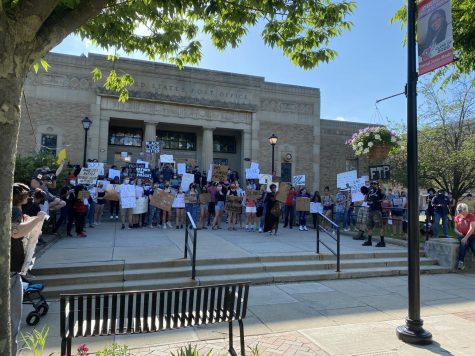
Demonstrations against police brutality — including a June 6 protest in Tappan Square — arose across the nation this summer, sparking a year of discourse around racial justice. Conversations within the College and Conservatory included calls for action, notably ABUSUA’s demands for institutional reform and arguments for defunding the Oberlin Police Department. In an effort to enact change at the institutional level, President Ambar introduced the Presidential Initiative on Racial Equity and Diversity, the Conservatory released an action plan for racial equity and diversity in Oberlin’s music education, and the College co-founded the Liberal Arts College Racial Equity Leadership Alliance with six other institutions.
Students engaged in justice and activism work both within and outside of the Oberlin community. In an effort to combat COVID-19’s disproportionate effect on low-income and first-generation students, a group of students created the Coronavirus Oberlin Mutual Aid Fund this summer. This fall, students founded the Oberlin People’s Assembly, which has been providing community members with rent assistance, hot meals, and other aid.
New dialogues have begun this year as members of the campus community interrogate racial inequalities at Oberlin. During winter break, student senators delivered a presentation to the Board of Trustees on the Black experience and how to enact change on Oberlin’s campus. This conversation with the board continued in another student-led meeting earlier this month. Within the athletics community, students founded the Black Student Athlete Group and started critical conversations on Asian American representation and discrimination in athletics and active anti-racism within teams. And only two weeks ago, on the last day of Black History Month, the Conservatory came under fire for posting a flier for the faculty recital “A Celebration of Black Artistry,” which featured exclusively white performers.
In October, Oberlin faced international scrutiny after Mohammad Jafar Mahallati, Nancy Schrom Dye Chair in Middle East and North African Studies, was accused of participating in a human rights abuse cover-up during his time as an Iranian ambassador to the U.N. Mahallati denied the allegations. Nevertheless, the accusation provoked outcry against the College.
Check out our top racial justice stories this year:
ABUSUA Demands Institutional Reform from Administrators, Board of Trustees
Defund Oberlin Police to End History of Racial Oppression
Here are some stories you might have missed:
My Thoughts Have Value: A Radical Black Feminist Perspective on Student Activism
Black Senators, Student Panelists Address Trustees on Racial Equity
A Fraught Election Year, Locally and Nationally

The last year has been a roller coaster for politics nationwide, and Lorain County was no exception. Oberlin students and citizens alike were swept up in national and local issues, such as the race to represent Ohio’s Fourth Congressional District and school funding ballot measures. From the beginning, the pandemic created new hurdles when students were forced to leave campus only days before the Ohio Presidential Primary, prompting students to create a rideshare program for early voting. As the pandemic stretched into the summer, administrators and students began thinking more about voting accessibility.
The 2020 election did not run smoothly for many Ohioans. Voters across the Midwest, including nearly 800 college students, were not mailed their absentee ballots on time, which left some students unable to vote. Another October surprise — Donald Trump contracting COVID-19 — hit home when Ohio representative Jim Jordan was exposed to the president on Air Force One.
Although student efforts to make Election Day a campus holiday were not successful, all faculty were recommended to cancel classes. When Election Day finally came, the suspense was drawn out over four days as ballots for the presidential election were counted. After Biden was elected, Oberlin’s campus did not see the same celebrations that erupted at other colleges. Instead, many students breathed a sigh of relief and pivoted toward a new era of activism under the new administration.
Check out our top stories from local politics this year:
Freshour Wins Democratic Primary for 4th Congressional District
Jim Jordan, Shannon Freshour Debate the Economy, Pandemic
Here are some stories you might have missed:
In the Midst of Absent Ballots for Ohio’s Absentee Voters, Obies Continue GOTV Initiatives
Oberlin Professors Weigh in on a Narrowing Election
Oberlin’s Local Election Results
The Community Carries On
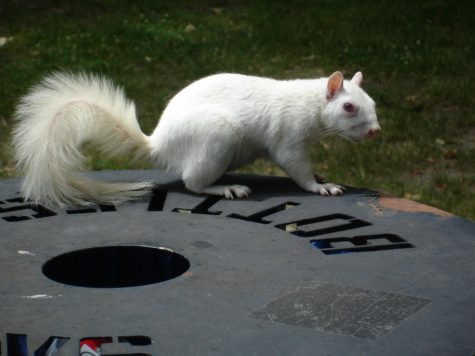
Amid the chaos of COVID, the Oberlin community found ways to stick together. Residents sadly said goodbye to many beloved restaurants like Black River Cafe, the Corner Joint, Oberlin Kitchen, and Quick & Delicious this year. However, the city welcomed new restaurants like the Arb at Tappan Square and Steel Magnolia to the array of food options in downtown Oberlin. Students also embraced the reopening of a crowd favorite, Agave. The restaurant reopened under new leadership and with a new name — Agave Burritory — but serves the same hot and gooey burritos that Obies know and love.
In Tappan Square and other Oberlin greenspaces, students and community members alike remain enchanted by the sight of the albino squirrel. And on the Oberlin Bike Path, recreational runners and bikers continue to enjoy the beauty of Northeast Ohio.
Thanks to the creativity of students, staff, and faculty, many of the College’s favorite traditions carried on in new ways. This year’s students participated in an ObieSafe Art Rental, students took to the catwalk in “quarantine couture” for the annual Black History Month Fashion Show,, and sports teams “kept yeoing” with socially distanced practices and community-building efforts.
The Oberlin v. Gibson’s lawsuit also continued into this year with the College appealing the court’s $25 million verdict and the Gibson’s cross-appealing for $44 million in damages.
Check out our top city stories this year:
Burritos Back in Business: Agave Reopens
Oberlin Loves Its White Squirrels
Here are some stories you might have missed:
Steel Magnolia, The Arb at Tappan Promise Community, Good Food in Uncertain Times
College, Gibson’s Bakery File Briefs Appealing $25 Million Verdict
Major Administrative Transformations
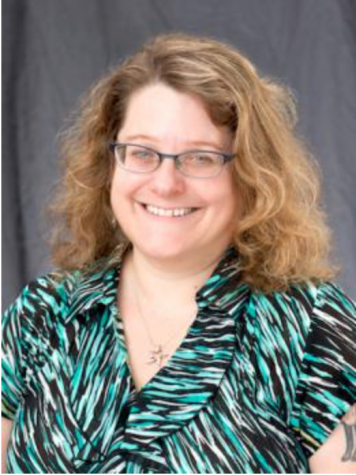
Institutions are often slow to adapt to change, but this year, Oberlin College and Conservatory was forced to pivot again — and again. In response to the COVID-19 pandemic, Oberlin dipped into the endowment to cover pandemic-related deficits that were expected to reach $44.7 million and instituted cost-saving measures. In the late fall, many of these changes were rolled back when new estimates found that the College was $5 million better off than anticipated, and that the overall COVID-19 deficit would likely be $10 million less than initial projections and top out at $34.7 million. However, this financial trouble came on top of a preexisting structural deficit. The College faced major backlash after outsourcing 108 union jobs to help balance the budget.
Not every change the school made in response to COVID-19 went smoothly for students. In the late spring, students still living in campus housing were forced to pack up and consolidate to a few north campus dorms during their busy, virtual semester. Many students still haven’t been able to recover lost items that they left behind in the rush to leave campus. The three semester plan has received mixed reviews from third-years, with one survey showing that 64 percent of third-year respondents saying they felt more depressed or anxious during their off semester than they would have been if they were in school.
Students arrived on campus to a transformed dining experience — including multiple new dining halls and a carry-out only model — courtesy of new ObieSafe restrictions and the College’s new dining provider, AVI Fresh. The convergence of COVID-19 safety and financial concerns prompted the permanent closure of two beloved dining co-ops, Fairchild and Kosher Halal. The Oberlin Student Cooperative Association also signed a new rent contract with the College that included major changes to the rent model which ultimately resulted in the temporary closure of Old Barrows and Brown Bag Coops.
A year into the pandemic, Oberlin prepares for its next big administrative shift with the reconvening of the One Oberlin committee, which will continue its work to address the College’s structural deficit. The College also launched its search for the next Vice President and Dean of Students after Meredith Raimondo returns to her position on the faculty this fall.
Check out our top stories is administrative changes this year:
Oberlin Has Transparency Problems
New Dining and Custodial Vendors Transition to Oberlin
Here are some stories you might have missed:
OSCA Signs New Rent Contract; Fairchild and Kosher Halal Co-ops Close Their Doors
After Bon Appétit’s Negligence, AVI Fresh Off to a Promising Start with South Asian Cuisine
Entertainment in a Year of Isolation
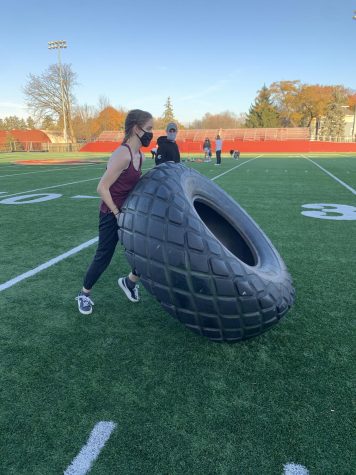
With quarantine limiting social activity, many people found themselves more drawn to entertainment media than ever before, and the Arts section covered what Obies were watching in a four-part series. The student documentary Boxes Will Be Provided illustrated how Oberlin’s pandemic affected Black students. Graduating theater and dance students reimagined their culminating performances, and Obies kept on sharing songs, insight, and silliness in their WOBC shows.
The Sports section inspired people to practice good hygiene with “Hype Music You Can Wash Your Hands To,” and weighed in on one of Netflix’s top shows of 2020 and the unlikely sport that made a big comeback this year: The Queen’s Gambit and competitive chess. Although athletic games were suspended, the College brought back some competition with the inaugural Presidential Tire Flip Challenge. All students were encouraged to try their hand at tire flipping and challenging President Ambar’s record — whether they achieved one or 31 flips.
Check out our top viewed entertainment stories this year:
Danny Prikazsky, OC ’14, “Are You the One?” Cast Member
SleepWalker’s 2020 Freshman List
On the Record: What It’s Like To Be On an Episode of Queer Eye
Here are some stories you might have missed:
Chadwick Boseman and Becoming a Hero
Samuel George, OC ’07, Documentary Filmmaker
Judas and the Black Messiah Deservedly Valorizes the Black Panther Party
Remembering Lives Lost
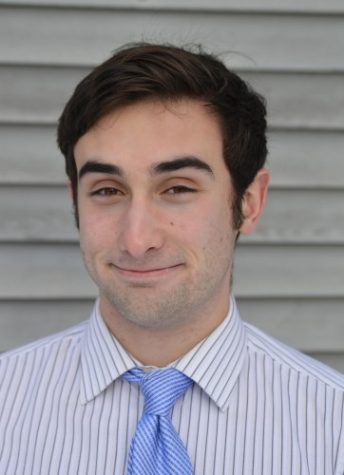
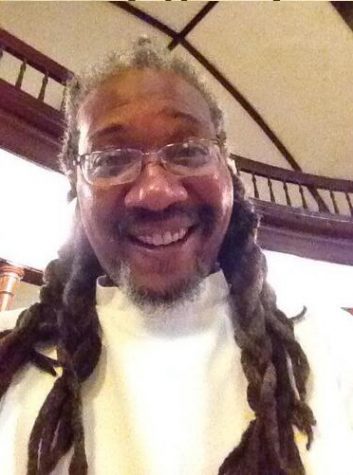
In a year ravaged by disease, it is imperative to acknowledge the painful losses that our community has reckoned with, related or unrelated to COVID-19. Grieving openly for those in our community who have passed may be a step in the healing process for some after this difficult year. The Review aims to help sustain their memories.
Remembering Jeffery Joseph Horton (Meeko Israel)


